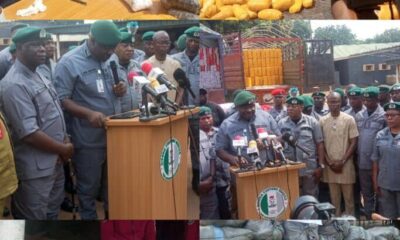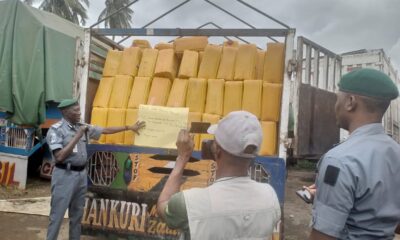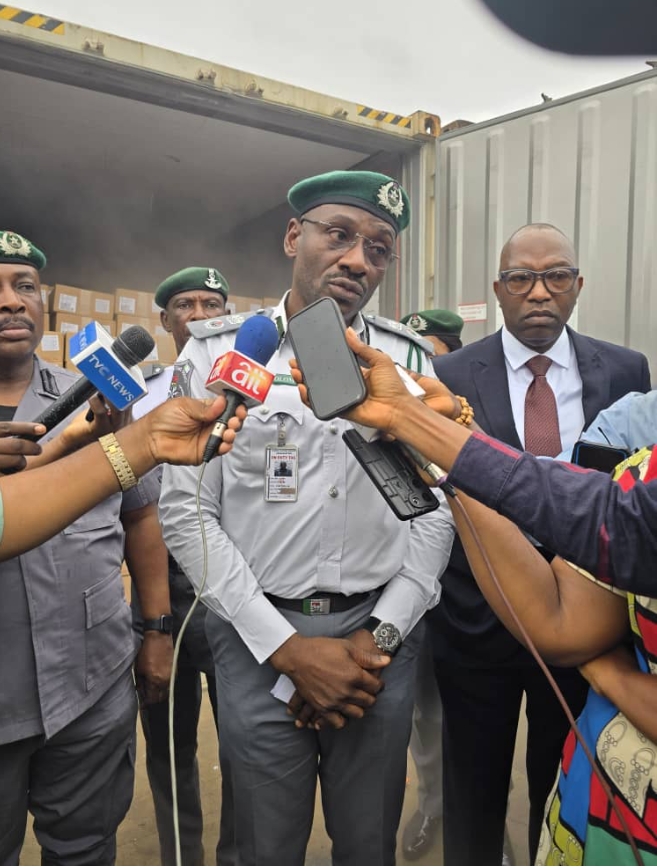Maritime Agencies
HUGE IRONY: Nigerians Battle Hunger, Seme Customs Confiscates Beans For Export.
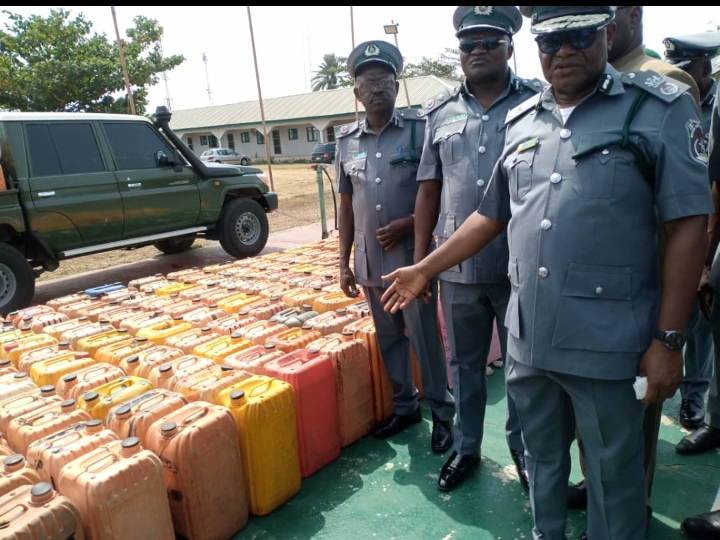
By Izuchukwu Ozoemena
The Nigeria Customs Service (NCS) has once again reminded Nigerians that the Customs Act 2023 forbids illegal exportation of grains or any other food item as any activity that contravenes this provision especially in the face of crushing hunger attracts stiff sanctions.
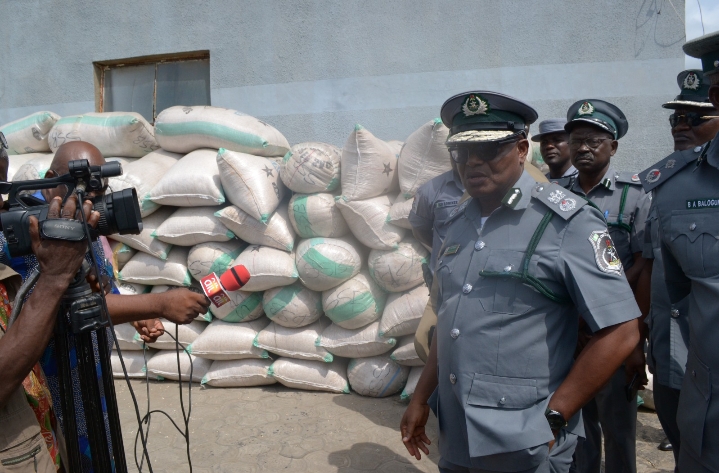
Customs Area Controller (CAC), Seme-Krake Joint Border Command, Comptroller Timi Bomodi reiterated this,Tuesday, while showcasing 400 bags of intercepted beans whose networth value is N61.45million billed for illegal exportation from Nigeria to the Republic of Benin.
He recalled that as per Federal Government’s stand on this, “we need to ensure that what is being produced locally stayed within the country before we export. The new Customs Act says grains can’t be moved out of the country and when it’s done, there is a procedure which includes NXP, CCI, among others. When that is not done, any attempt to do it illegally will face the wrath of the law,” he emphasized.
“The current market price for beans is put at N120,000 or so per bag. So, if we use that as the Duty Paid Value (DPV), then we will be talking about over N61 million worth of beans. By the time we go to the market, we will be discounting for selling these and it will be sold to the members of the public at a considerably reduced price.”

The Command also showcased a total of 400 kegs of Premium Motor Spirit (PMS), an equivalent of 12,000 litres with a DPV of N8,347,680. These were intercepted along the creeks on March 2, 2024.
Acting on credible intelligence, the CAC explained, the Command was swift in deploying gallant officers to the creeks to monitor real time, attempts to move those items by boat with the aim to intercept and recover the illicit products.
“They were actually being brought in in large sacks. So, we have to move them and bring them here and of course, put them back into kegs that will make them stable. We know that because of the nature of petroleum products, it’s not something that we can warehouse over a long period of time. Very shortly, we’ll start auctioning these items to members of the public, some of whom I see hanging around.
“When the auctioning takes place, the money will be paid into the coffers of the Federal Government just to account for the sale of these items.”
Bomodi regretted the challenge of tackling smugglers on water.
“Anytime they are tackled on land, they have the tendency to move to the water. We have limited capabilities on water. Even though there are resources that are there but you are talking about a very wide body of water. You are not just talking about the creeks, you are talking about the whole Atlantic and it is often difficult. But we are still ready to put all the resources we have at our disposal to ensure that practices of this nature are discouraged and discontinued.”
The CAC gave thumbs-up to leaders within the Badagry area for showing exemplary conduct.
“They have managed to create a buffer for us – the agencies of government – and the communities by explaining to them what the intentions of the government are and how they should, indeed, make efforts to cooperate with us to see that these items that pose a threat and danger to Nigeria and Nigerians do not either leave the country or come in.”
Reacting to concerns on the possibility of the smugglers fighting back as the illegal products are being evacuated, Bomodi said it is natural.
“It’s a normal practice. Anytime you have to evacuate products either PMS, rice or any other thing, there’s a threat and we are not just talking about those that are actively involved in it. Sometimes, we have certain communities that present hostile faces to us.
On the confiscated bags of beans, Comptroller Timi Bomodi disclosed that they are safe in government warehouse and would be sold to the public at a discounted rate.
Once the Customs Headquarters approves, he assured, the items would be moved to the market for sale at discounted price.
“Ordinarily, these things shouldn’t be leaving the country when we have food crisis in the country. We must ensure that that which is being produced within Nigeria is used up within Nigeria.”
“The citizens of this country come first and the government of the day is prioritizing the needs of the people and that is why the Nigeria Customs Service has undertaken this bold step to make this arrest and to ensure that these goods eventually end up at the market places where they will be distributed to Nigerians at a cost that is affordable”.
Maritime Agencies
Suspend Charges Review, Engage Stakeholders, Shippers’ Council Tasks Shipping Companies
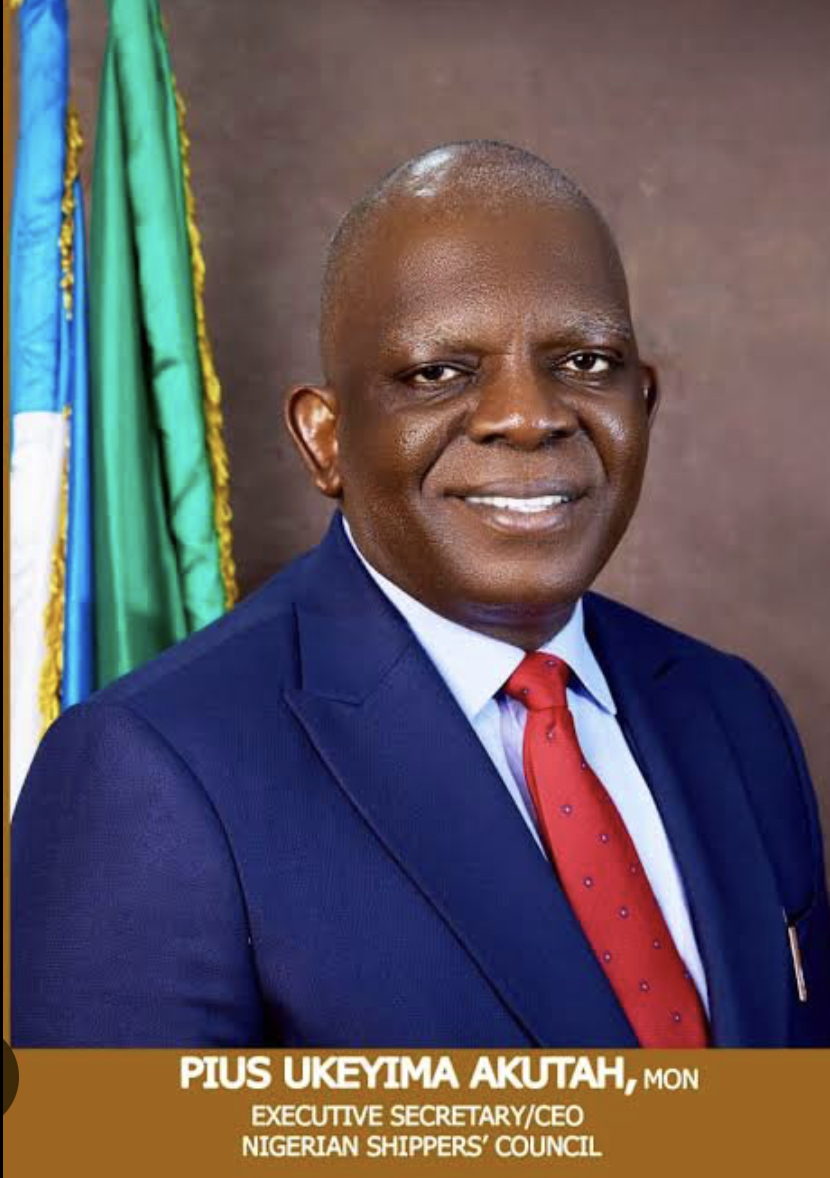
By Izuchukwu Ozoemena
All shipping companies, shipping agents, and terminals operating within Nigerian ports have been given marching orders to suspend and discontinue the implementation of any review or upward adjustment of their charges until they have fully engaged their stakeholders.
This is contained in a release by Rebecca Adamu, Head of Public Relations of the Nigerian Shippers’ Council, Nigeria’s Ports Economic Regulator.
The Nigerian Shippers’ Council clarifies that the recent adjustment was approved strictly in accordance with her statutory mandate as the Port Economic Regulator in which case all tariff reviews were conducted in a transparent, structured, and well-defined regulatory process.
”These processes included detailed technical and consultative engagement with affected service providers aimed at examining the cost drivers, operational realities, investment obligations and regulatory compliance.”
”The engagements did not constitute automatic approvals; rather, they informed a broader evaluative process. Final determinations were reached only after rigorous internal, technical, and financial assessments guided by empirical evidence, regulatory benchmarks, and prevailing economic conditions.”
”Notwithstanding, shipping companies, agents, and terminal operators are hereby directed to suspend any intended review of charges until they have duly consulted and engaged their stakeholders. As the Port Economic Regulator, the Nigerian Shippers’ Council will wield the big stick against any port service providers disrupting port operations”, the statement warned.
The Council emphasised that transparency, fairness, and stakeholder participation are fundamental principles underpinning port economic regulation in Nigeria.
The Executive Secretary/Chief Executive Officer of the Council, Dr. Pius Akutah (MON), further warned that the Council is empowered under its regulatory mandate to apply appropriate sanctions against defaulting operators, including enforcement measures provided for under relevant regulatory frameworks. He encourages constructive engagement, dialogue, and compliance.
Any service provider that proceeds with charge reviews without stakeholders’ engagement should be prepared to face decisive regulatory action.
He assured that the Nigerian Shippers’ Council remains committed to protecting the interests of port users, promoting fair competition and ensuring a balanced and predictable business environment within the Nigerian maritime industry.
Customs
FG Inaugurates Nigerian Shippers’ Council Board, Highlights Need for Reduced Port Costs, Fair Pricing.
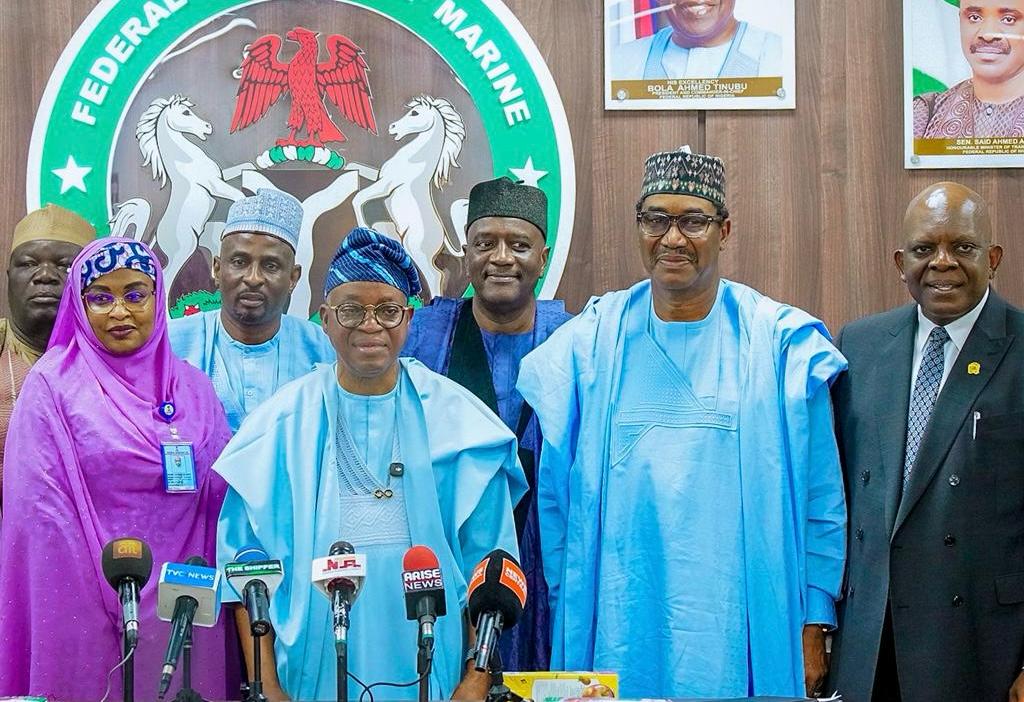
By Izuchukwu Ozoemena
The inauguration of a new Board for the Nigerian Shippers’ Council, Monday, sets a clear reform agenda for Nigerian seaports as reduced port costs and fair pricing now take centre stage.
Dr Bolaji Akinola, Special Assistant (Media and Publicity) to the Minister of Marine and Blue Economy, stated this in a statement.
At the event, Minister of Marine and Blue Economy, Alhaji Adegboyega Oyetola charged the Board to focus on improving accountability in operations, reduced cost of doing business and strengthened regulation processes across the shipping sector.
The reconstitution of the Council’s governing structure, he stated, follows the resolve of President Bola Ahmed Tinubu to ensure that good governance and repositioning of the Marine and Blue Economy should serve as a key engine of national economic growth under the Renewed Hope Agenda.
Oyetola reminded the Board that as Nigeria’s Port Economic Regulator, the Shippers’ Council is central in efforts to achieve efficiency, transparency and fairness in port charges and service delivery.
Robust economic regulation, the Minister maintained, is critical to lowering trade costs, protecting shippers and improving Nigeria’s competitiveness within the sub-region and beyond.
The Minister urged Board members to provide firm strategic leadership and effective oversight, insisting that regulatory decisions must translate into measurable outcomes, including improved port efficiency, fair pricing, and enhanced trade facilitation.
He called for seamless collaboration between the Board and the Council’s management, while assuring members of the Ministry’s full support in delivering their mandate.
Dr Ibrahim Shema, former Governor of Katsina State, is the Chair of the newly -inaugurated Board. Other members are Dr. Pius Akutah, MON, Executive Secretary/ Chief Executive Officer of the Council; Dr. Emi Membere-Otaji (NACCIMA); Mr. John Aluya (MAN); Rt. Hon. Chiji Collins and Mrs Olufunmilayo Olaseinde.
Others are Dr. Funmilola Rashidat Adeoti; Alhaji Mele Kofo Gladem; Mrs Hafsatu Mohammed (NNPCL); Hon. Maharazu Adamu Dayi; and Mrs. Uzoamaka Okereke from the Ministry of Marine and Blue Economy.
Speaking on behalf of the Board, Dr. Shema thanked President Tinubu for the opportunity to serve and commended the Minister for his leadership of the sector. He pledged that the Board would uphold professionalism and integrity while supporting reforms aimed at improving port performance, strengthening regulatory effectiveness, and delivering tangible benefits to shippers and the national economy.
NSC serves as Nigeria’s Port Economic Regulator, mandated to promote efficiency, transparency, competitiveness, and fairness in port operations, while safeguarding the interests of shippers and enhancing the country’s maritime trade environment.
Maritime Agencies
OIL FACILITIES PROTECTION: Tompolo’s Tantita Acquires High-Tech Drones From US Firm.

By Izuchukwu Ozoemena
Tantita Security Services Ltd (TSSL), the company in charge of security surveillance over oil and gas installations in Nigeria’s Niger Delta region, is in collaboration with Textron Systems Corporation, a United States–based defence and aerospace company, to supply her three advanced Aerosonde Mk. 4.7 Vertical Takeoff and Landing (VTOL) uncrewed aircraft systems (UAS).
TSSNL owned by Chief Government Ekpemupolo (popularly known as Tompolo) disclosed the business deal in her website publication of December 29, 2025. The drones will be delivered in a fully ITAR-Free configuration.

The Aerosonde Mk. 4.7 is designed to operate without runways, utilising hybrid quadrotor technology that enables vertical takeoff and landing, as well as fixed-wing flight.

The Aerosonde Mk. 4.7 VTOL UAS, Textron Systems says, is a mature, industry-proven autonomous platform known for its high reliability and operational flexibility. Its dual-mode capability allows it to operate seamlessly in complex and high-risk environments, making it well-suited for security operations within Nigeria’s oil and gas sector.
Giving further insight into the contract, Senior Vice President, Air, Land and Sea Systems at Textron Systems, David Phillips, said the deployment would significantly enhance Tantita’s operational capability.
”The Aerosonde Mk. 4.7 VTOL UAS is a proven solution that will enable Tantita Security Services to expand its capabilities to protect the oil and gas infrastructure essential to Nigerian security and prosperity,” he stated.
The Aerosonde platform has accumulated over 700,000 flight hours across some of the world’s most challenging operating environments, underscoring its reliability and performance.
Tantita Security Services is expected to deploy the systems to strengthen surveillance and protection of critical oil and gas assets across Nigeria.
The contract also includes options for operator training and the supply of additional aircraft to support future capability expansion. Textron Systems noted that the agreement builds on a previous Foreign Military Sale (FMS) contract to Nigeria, further highlighting its ongoing commitment to supporting Nigerian security operations.
Textron Systems is a global leader in uncrewed air, land and sea systems, with the Aerosonde family of UAS currently supporting international customers and operations aboard more than 10 U.S. Navy ships. The company is a subsidiary of Textron Inc. (NYSE: TXT), a diversified multinational with interests spanning aviation, defence, industrial manufacturing and finance.
With multiple payload configurations and comprehensive training and support services, the Aerosonde Mk. 4.7 VTOL UAS offers a versatile and efficient solution for security operations in demanding environments, reinforcing Tantita Security Services’ role in safeguarding Nigeria’s critical energy infrastructure.
-

 Maritime Agencies2 weeks ago
Maritime Agencies2 weeks agoOIL FACILITIES PROTECTION: Tompolo’s Tantita Acquires High-Tech Drones From US Firm.
-

 Maritime Agencies3 weeks ago
Maritime Agencies3 weeks agoNEW YEAR CELEBRATION: MARAN Appreciates Stakeholders, Requests Greater Support and Collaboration in 2026.
-
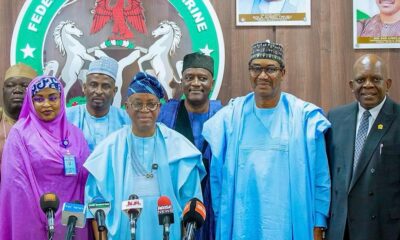
 Customs2 days ago
Customs2 days agoFG Inaugurates Nigerian Shippers’ Council Board, Highlights Need for Reduced Port Costs, Fair Pricing.
-
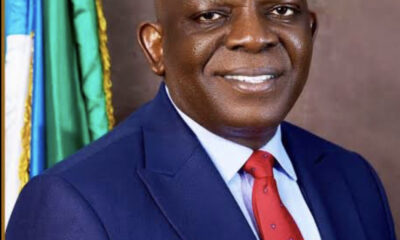
 Maritime Agencies2 days ago
Maritime Agencies2 days agoSuspend Charges Review, Engage Stakeholders, Shippers’ Council Tasks Shipping Companies


